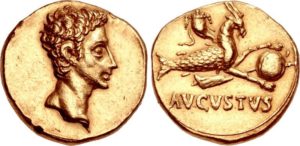[Greek] χρυσός (chrysos), [Latin] aurum, [German] gold: gold, yellow, gold coin, gold money; Mt.2:11, Mt.23:16-17, Act. 17:29, 1Cor.3:12, Jas.5:3, Rev.9:7, Rev.18:12, Mt.10:9

Augustus Aureus (27 B.C. – 14 A.D.)
Background Information:
Greek Hellenism: This term means gold, precious metals, anything made of gold, anything precious, and ‘golden words’. Giving gifts to gods comes from traditions preceding Christianity. It is recorded that the Syrian King Seleucus II Callinicus offered gold, frankincense, and myrrh to the god Apollo at the Temple in Meletus in 243 B.C.
Homer’s Iliad 10.294: “Her will I sacrifice a sleek heifer to thee and will overlay her horns with gold.”
Plato’s Statesman 303d: “But another group remains which is still more difficult to separate because it is more closely akin to the kingly class and it is harder to recognize. I think we are in somewhat the same position as refiners of gold.” Aristophanes’ Plutus 268 states “This news is worth its weight in gold! No doubt it means he is bringing back a heap of wealth.”
Plato’s Republic 3.413e: “Testing them much more carefully then men do gold in fire.”
Aeschylus’ Libation Bearers 372: “In this, my child, your wish is better than gold.”
Old Testament: This term can mean gold, measure of weight, splendor, pure, sharpened, judgment (something decided), and bright.
New Testament: This term refers to gold and gold money. Gold is represented as a precious metal, gifts, objects of oaths, gods, and elaborate ornamentation. Gifts of gold are offered to the infant Jesus. The presented gold represents the kingship of Jesus. The disciples are not to take gold money with them in their travels to evangelize others. Swearing by gold illustrates an inverted (upside-down view) on the importance of swearing oaths to gold rather than to God. Paul instructs the Athenians that God is not an image fashioned by gold. Rather than using elaborate gold ornamentation, women are called to dress with modesty in the liturgical assembly. Even gold will eventually erode and corrode.
Early Christianity: John Chrysostom (349-407 A.D.) became Archbishop of Constantinople. He is known for his preaching, eloquence, and public speaking abilities. Chrysostos means “golden-mouthed” in Greek, denoting his celebrated eloquence (golden words).
Scripture:
“Then they opened their treasures and offered Him gifts of gold, frankincense, and myrrh.” Mt.2:11
Gold was one of the standard gifts offered to kings in the ancient world. Gold represents kingship.
“Since therefore we are the offspring of God, we ought not to think that the divinity is like and image fashioned by gold, silver, or stone by human art and imagination.” Acts 17:29
Paul was appealing to the Athenians’ religiosity. Paul is Lord of heaven, not a divinity fashioned by gold.
“Similarly, too, women should adorn themselves with proper conduct, with modesty and self-control, not with braided hairstyles and gold ornaments, or pearls, or expensive clothes.” 1Tim.2:9
In a liturgical assembly, women (and men) should dress modestly and appropriately to the occasion.
Etymology: From the earliest times, gold was always associated with the sun. The Latin aurum means yellow. This is related to the Latin aurora (morning glory). The aureus was a golden coin of Ancient Rome. Aurora is the Roman goddess of the dawn.
Conclusion:
Chrysanthemum, gold, aurora
In the Greek Hellenistic era, it was interesting to discover that this term can metaphorically mean something precious and golden words. There begins historical precedence in offering gifts to gods (deities). St. John Chrysostom spoke golden words of wisdom.
In the New Testament, oaths were abused and misused. Swearing by gold illustrates, skews or inverts the true meaning of an oath given to God. It is also timeless wisdom in saying that everyone should dress modestly at a liturgical assembly. Gold represents kingship and divinity. It was interesting to note that bringing gifts comes from the Hellenistic tradition of bestowing homage to gods. There is no record of how much gold the three kings offered to the baby Jesus. However, the gold mostly would have been gold shekels with the image of Augustus.
I think you know what comes after gold. ☺☺☺
